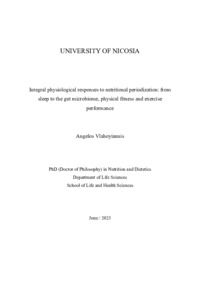- Vlachoyiannis, Angelos
- 14 June 2023
- English
- 236 pages
- Giannaki, Christoforos | Andreou, Eleni | Aphamis, George
- Carbohydrate Periodization | Glycemic Index | Glycemic Load | Polysomnography | Actigraphy | Βody Composition | Athletic Performance | Cardiorespiratory Fitness | Visual Reaction | Counter Movement Jump | Gut Microbiota
- Life and health sciences -- Nutrition and Dietetics
-
-
Over the years there is a rapid increase in the prevalence of inadequate sleep and its detrimental consequences. However, the effect of a long-term nutrition intervention on sleep optimization has not been studied yet. We first conducted a systematic review, meta-analysis and meta- regression regarding the impact of carbohydrates on sleep. It was found that acute interventions with decreased intake of carbohydrate (CHO) quantity favored N3 stage sleep proportion and duration, whilst increased dietary CHO intake prolonged REM stage sleep. The acute manipulation of the CHO quality did not show any significant effect on sleep stages, however affected measures of sleep continuity. The intervention part of the present PhD project examined whether a long-term carbohydrate periodization intervention could optimize sleep, and affect body composition, athletic performance and gut microbiome. Forty-two healthy, physically active male volunteers were recruited and participated in this one-month randomized-controlled nutrition and exercise intervention. The intervention lasted four weeks and consisted of three groups: i) Sleep Low- No Carbohydrates (SL-NCHO): participants consumed all their carbohydrate intake at regular intervals prior to the evening exercise training session, ii) Sleep High- Low Glycemic Index (SH-LGI) and iii) Sleep High- High Glycemic Index (SH-HGI): Carbohydrate intake was spread evenly throughout the day both prior (60% of total CHO intake) and after (40% of total CHO intake). The SH-LGI and SH-HGI groups differentiated in the evening carbohydrate quality, consuming either LGI or HGI foods, respectively. Alongside, participants performed a supervised standardized exercise program combining resistance exercise and HIIT sessions. Participants’ nutritional status, sleep-related measures, body composition, athletic performance, as well as stool and blood samples were collected at baseline and at the end of the intervention to assess the intervention effect on sleep, body composition, exercise performance and gut microbiome, collectively. The results revealed that sleep initiation, continuity and duration were improved in all trials (p<0.005). However, sleep duration variability reduced significantly only in SL-NCHO and SH-LGI trials p<0.005), but not in the SH-HGI trial (p>0.05). Deep sleep was increased more in individuals with inadequate sleep duration and low sleep efficiency in the SL-NCHO trial, compared to good sleepers (p<0.05). Accordingly, sleep duration increased more in poor sleepers in the SH-LGI trial, than in good sleepers (p<0.05). Body fat mass, fat-free mass, as well as athletic performance, were significantly improved in all trials (p<0.05). In contrast, visual reaction time performance improved more in individuals with low sleep efficiency and low self-reported sleep quality in the SH-HGI trial, compared to good sleepers (p<0.05). Overall, complex relationships appeared between exercise nutrition and sleep, while gut microbiome regulation mediated these correlations (p<0.05). Considering those findings, it was shown for the first time that a one-month nutrition intervention in combination with exercise training largely affected sleep, body composition and athletic performance in trained individuals. It is essential that lifestyle medicine and relevant interventions will be under further investigation, in terms of sleep and overall health improvement.
-
Integral physiological responses to nutritional periodization: from sleep to the gut microbiome, physical fitness and exercise performance.
Main Files
| Type | Location | Link |
|---|---|---|
| dissertation | [More information] |


